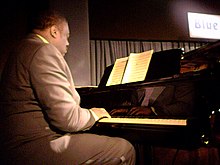Mulgrew Miller
| Mulgrew Miller | |
|---|---|

Miller in 2004
|
|
| Background information | |
| Born | August 13, 1955 Greenwood, Mississippi, U.S. |
| Died | May 29, 2013 (aged 57) Allentown, Pennsylvania, U.S. |
| Genres | Jazz |
| Occupation(s) | Musician, composer, educator |
| Instruments | Piano |
| Years active | 1970s–2013 |
| Labels | Landmark, Novus, Maxjazz |
| Associated acts | Art Blakey, Woody Shaw, Tony Williams |
Mulgrew Miller (August 13, 1955 – May 29, 2013) was an American jazz pianist, composer, and educator. As a child he played in churches and was influenced on piano by Ramsey Lewis and then Oscar Peterson. Aspects of their styles remained in his playing, but he added the greater harmonic freedom of McCoy Tyner and others in developing as a hard bop player and then in creating his own style, which influenced others from the 1980s on.
Miller's style evolved through playing with a series of major jazz figures. After leaving university he was pianist with the Duke Ellington Orchestra for three years, then accompanied vocalist Betty Carter. Three-year stints with trumpeter Woody Shaw and with drummer Art Blakey's high-profile Jazz Messengers followed, by the end of which Miller had formed his own bands and begun recording under his own name. He was then part of drummer Tony Williams' quintet from its foundation, while continuing to play and record with numerous other leaders, mostly in small groups. Miller was Director of Jazz Studies at William Paterson University from 2005, and continued to play and tour internationally with other high-profile figures in the music until his death from a stroke at the age of 57.
Mulgrew Miller was born in Greenwood, Mississippi, to parents who had been raised on plantations. He had three brothers and four sisters. His family was not musical, but they had a piano, which no-one in the house could play. Miller, however, played tunes on the piano from the age of six, playing by ear. He had piano lessons from the age of eight. As a child, he played blues and rhythm and blues for dances, and gospel music in a church. His family was Methodist, but he played in churches of various denominations. His principal influence on piano at this stage was Ramsey Lewis.
...
Wikipedia
